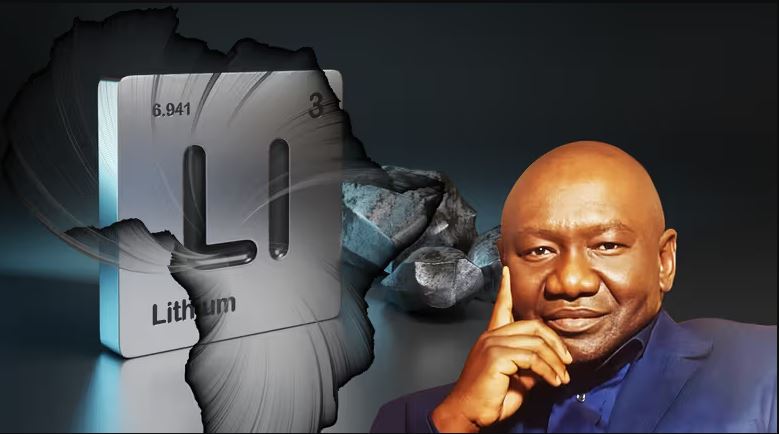
BENEDICT PETERS! From Billionaire Businessman to Africa's 'Green Czar'
Benedict Peters has been anointed Africa’s “Green Baron,” a testament to his pivotal role in steering the continent toward becoming an indispensable supplier of critical minerals for the global green economy. This marks a significant departure from his origins in oil and gas, spotlighting a future where Africa’s vast mineral wealth underpins the worldwide shift to renewable energy and sustainable technologies.
“The transformation led by Benedict Peters from hydrocarbons to critical minerals is not merely strategic but a visionary leap in positioning Africa at the heart of global sustainable development,” said Oluwatosin Racheal Alabi, senior editor of The African Miner.
Peters’ investment in uranium, lithium, platinum, and a plethora of other critical minerals is crucial for the next generation of green technologies, from electric vehicles to lithium batteries, securing Africa’s place as a vital player in these supply chains.
Central to Peters’ strategy is a groundbreaking partnership between his integrated energy giant Aiteo and The Atlantic Council’s Africa Center, designed to showcase Africa’s potential to power the global energy transition. This collaboration moves Africa beyond being a passive supplier, aiming to establish the continent as a central stakeholder in the global green economy through sustainability and innovation.
This partnership is more than symbolic; it aims to directly address the innumerable challenges of mining critical minerals on the continent. By fostering closer dialogue among stakeholders, promoting policy advocacy, and encouraging technological innovation, the collaboration seeks practical solutions for sustainable mining practices, community engagement, and environmental protection. These efforts are instrumental in ensuring that Africa’s role in the global green revolution is both equitable and profitable.
Despite the acclaim, however, Peters faces difficult challenges. As critical minerals mining increases across Africa, pressing issues arise such as the need for responsible environmental stewardship, ethical practices, and equitable economic growth amid the fierce global competition for these scarce natural resources. “The path is indeed fraught with environmental, regulatory, and geopolitical complexities,” said Alabi, stressing the delicate balancing act required to harness Africa’s mineral riches responsibly.
Although critical minerals are desperately needed to fuel the growth of the global green economy, critics caution against overreliance on extractive industries, pointing out the risk of environmental degradation, community displacement, and economic volatility. They argue for a more balanced approach including renewable energy investments and economic diversification. Peters and his proponents acknowledge these concerns while advocating for responsible mining practices and reinvestment of mineral wealth.
The fruits of Peters’ endeavors are apparent. Throughout Africa, Peters’ mining projects have created thousands of jobs and launched community development programs focusing on education, healthcare, and infrastructure. These initiatives demonstrate how strategic investments in critical minerals can yield tangible benefits for local communities, beyond the immediate economic gains of employment.
“His critical minerals projects are already transforming local economies, creating jobs, and elevating environmental and community engagement standards in the mining industry,” said Adeodun Adenike Dorcas, an energy reporter and analyst at Energy News Africa Plus. “These efforts are not just reshaping mining throughout Africa as we know it, but also impacting policy frameworks, regional cooperation, and international partnerships, showcasing Africa’s fundamental role in the global green revolution.”
A Global Race for Africa’s Critical Minerals
The allure of Africa’s critical minerals sector is intensifying, attracting global powers into a competitive race to secure these resources. The United States, EU, Russia, and China are at the forefront of this new scramble, each seeking to ensure its stake in the future of the global green economy. This surge in interest marks a pivotal shift in international dynamics, transforming Africa from a repository of raw materials to a central battlefield in the global quest for sustainability and technological advancement.
In this intricate geopolitical game of chess, Peters emerges as a key player. By leveraging Africa’s vast wealth of critical minerals, he is not only drawing attention to the continent’s strategic importance but also keenly positioned to play a decisive role in securing future U.S. and EU supply chains. As nations vie for access to uranium, lithium, platinum, and other critical minerals essential for renewable energy technologies and electric vehicles, his collaboration with The Atlantic Council highlights his belief that the West must double-down on efforts to ensure that it remains competitive in the green revolution.
The intense global competition for critical minerals emphasizes the importance of fair mining practices and Africa’s capacity to shift the power dynamics in the worldwide green economy. Peters’ initiatives are catalyzing a new era of international cooperation, where Africa’s critical minerals are at the heart of energy transitions. As the continent becomes a focal point for securing the future of green technologies, the world watches closely as Africa’s role as a leading architect of the global green economy unfolds.
“Africa stands at the forefront of this transformative era,” Dorcas said. “Peters offers a true vision of a continent empowered by its critical minerals, paving the way to a sustainable, prosperous global future.”
In the face of global demand and competition, Peters’ leadership in mining critical minerals is carving a new identity for Africa on the world stage. With his newfound role as Africa’s “Green Czar,” it appears Peters’ vision is becoming a reality, as he steers the continent into a future where its mineral wealth is not just extracted but serves as the cornerstone of a sustainable and equitable global green economy. As Africa rises to meet this moment, Peters’ roadmap has the potential to resonate for generations, symbolizing a monumental shift from resource-rich continent to empowered global partner in the green revolution.
[give_form id="20698"]

